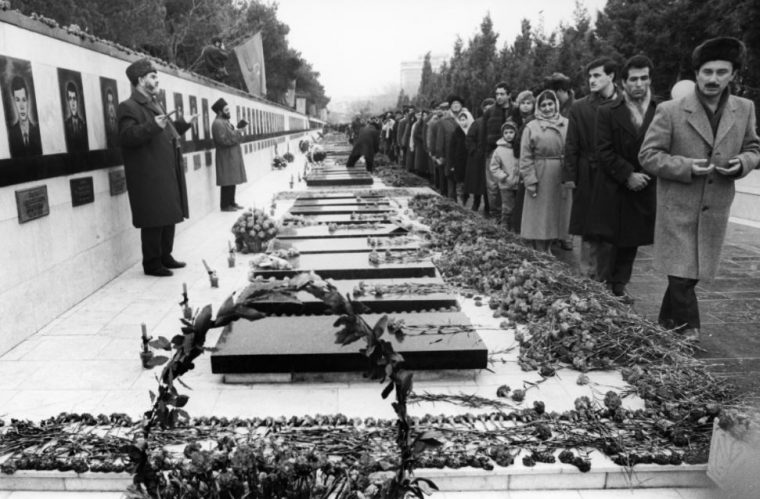By Rachel Avraham
On January 20th, Azerbaijanis around the world commemorate Black January, the day when the Soviet military violently cracked down on the civilian population in Baku due to their desire to have a more democratic system of government. On January 19 and 20th, 1990, the Soviet military massacred 147 innocent Azerbaijani civilians and several hundred others were wounded.
The Jerusalem Talmud says, “Whoever destroys a soul, it is as if he destroyed the world entire.” For this reason, this crucial day has significance for the entire free world and not just the Azerbaijani nation. As Jews who were raised on the principle of Tikkun Olam (“Repairing the World”), it is pivotal to study how a totalitarian government like the Soviet Union repressed an entire nation under its colonial rule, merely for the crime of wanting democracy and freedom.
Azerbaijani Jewish activist Esther Ha-Levi, who is now living in Canada, stressed that Black January was a major trauma for her, the Azerbaijani Jewish community and all of Azerbaijan to the point that her memories went blank, a classic PTSD symptom. She got her friend Mahmoud, who is also Azerbaijani, to help her remember certain details regarding what happened.
“Growing up in a multicultural environment, I was happy as a child,” she noted. “I just got married and then Black January happened. A bride and groom that I knew got married around the same time and they were killed. I always thought that it could have been me. It was the scariest time of our lives. People with masks would come in the middle of the night. You could not even see who was shooting and killing.”
HaLevi noted in the interview that three members of the Azerbaijani Jewish community were killed on Black January: Vera Besantina, a teenage girl who was shot by snipers for looking out the window of her home, Jan Meerovich, who was shot 22 times that day and Dr. Sasha Marchevka, a Jewish doctor killed inside an ambulance in the line of duty.
According to her, “To be honest, all I remember was the fear. We had no clue what was going on. They were killing everyone who got in their way. They did not really care. People who stood underneath the tanks thought they would not be killed, but they came and killed everyone. People stood on their knees in front of the tanks and the tanks just drove over them.”
For HaLevi, the most traumatic experience was the funerals: “There were mass funerals. Jews were victims of this instability alongside the Muslims and other people too. The suffering was not only inflicted upon Azerbaijani Muslims. The fact is that we had to leave the country we love. We had to leave because of the instability that was brought upon us. What happened is that Azerbaijan was ready for democratic reforms. The goal of those who came to crush the democratic freedom was to destroy the whole nation.”
According to HaLevi, “We as Jews were never separated. Everyone who was killed was buried in the same place. No religious distinction was made. Jews, Muslims, and Christians were all buried together. When you walk past soldiers with guns, imagine how that impacts your life. People live with those memories to this day. The killed could have been any one of us. We are lucky that we survived.”
Ha-Levi’s experience was in accordance with what British journalist Tomas de Waal wrote in Black Garden: “Tanks rolled over barricades, crushing cars and even ambulances. Witnesses spoke of soldiers firing at people who fled and of soldiers stabbing and shooting the wounded. A bus full of civilians was hit by a volley of bullets and many of its passengers, including a fourteen-year-old girl, were killed. An independent military investigation group known as Shield later concluded that the Soviet army had waged war on one of its own cities and called for criminal proceedings against Defense Minister Dmitry Yazov, who had personally commanded the operation.”
De Waal claimed that Black January was “the day Moscow essentially lost Azerbaijan. Almost the whole population of Baku turned out for mass funerals of the victims. The victims were the first martyrs to be buried in the Alley of the Martyrs on top of the hill in the city. Thousands of Communist Party members publicly burned their Party cards and even the chairwoman of the Supreme Soviet Elmira Kafarova denounced the actions of ‘army criminals.’”
Dr. Fariz Ismailzade, executive vice rector at Ada University, added: “January 20 is a very important day in Azerbaijan’s modern history. It is a tragic day of course because many civilians died for the sake of independence. However, it is also a dave of bravery and courage because these people were not afraid of the army of the largest empire in the world. They went out to the streets to protect their motherland, their country and to dream of independence. So, that was the day when an independent Azerbaijan was born and the Soviet Union collapsed. For the day when an empire uses tanks against its civilians, it is obvious that this Soviet Union could no longer survive.”
In conclusion, Rabbi Zamir Issayev proclaimed: “Black January is a remarkable date for all the nations that are living in Azerbaijan. Members of each community were killed. Even after the liberation of the Azerbaijani territories, the effect of such tragedies never fade, as it will forever be part of the national memory of Azerbaijan. I will always remember that on Black January, everyone went out onto the street to take the victims to the cemetery. Orthodox Priests, Muftis and Rabbis were all together, praying. So, even under the Soviets, humanity and friendship between the peoples of Azerbaijan was strong.”








